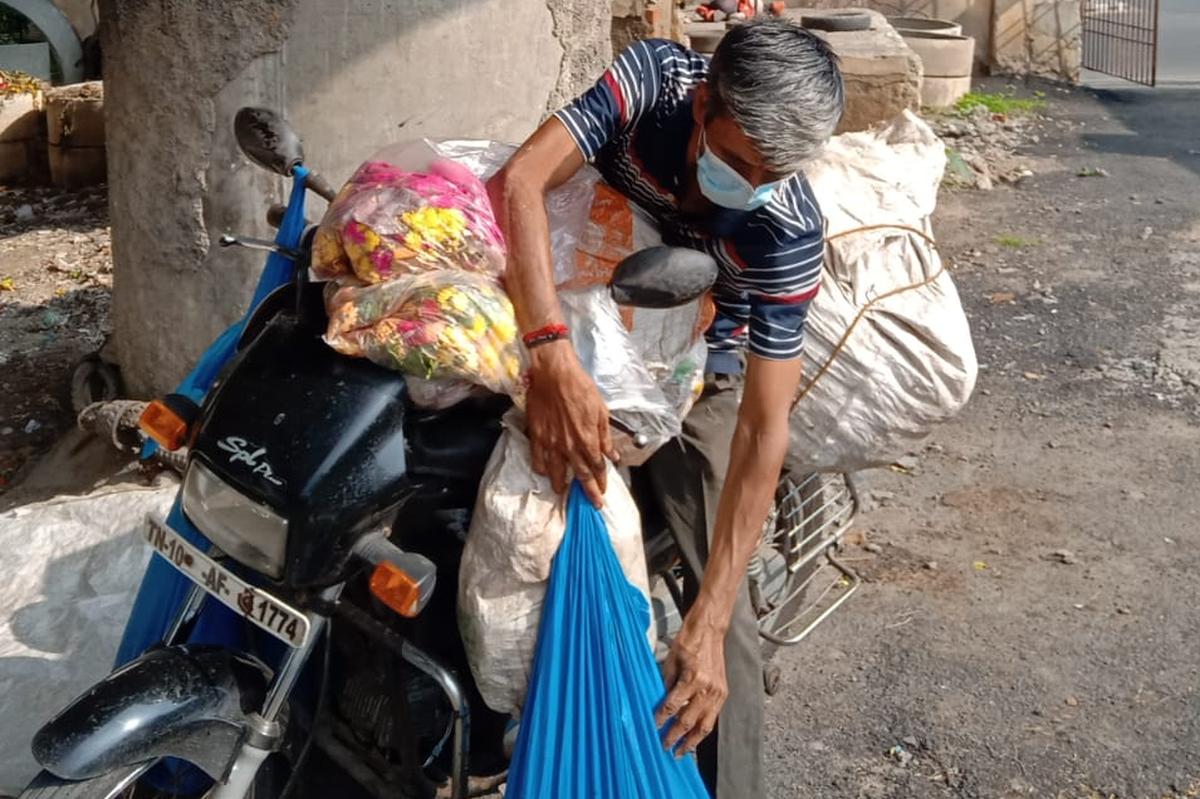Flower waste usually falls through the composting cracks, usually due to the lack of volume. Representational image only
Heavy-laden bags hanging down like gyves, from a motorcycle. And a man seated astride that vehicle hitting a meandering early-morning road he need not take, but did anyway. Those images were singular because of the regularity with which they occurred. They were intriguing because of the unusual volunteering effort they signified.
When Chennai barely stirred, that man, A.K. Kannan, would leave his home in Choolaimedu and visit temples on that motorcycle, picking up floral waste, coconut shells and other discards of worship, cram them into bags, drop them at Corporation’s compost yards and be at his office on time, which was Doordarshan’s Chennai Kendra in Chepauk.

Back in Chennai now after a job transfer had taken him away from the city, A.K. Kannan has resumed a “green exercise” that had earned him the admiration of sustainability enthusiasts.
| Photo Credit:
Special arrangement
When Kannan, civil engineer with Doordarshan, was transferred to Guwahati, Assam in 2023, that scene dropped out of sight abruptly. And with Kannan’s return to Chennai in February, 2025, that early-morning scene has now returned. An additional responsibility requires Kannan (56 years old now) to divide his days between Chennai and Guwahati offices: ten days in a month here, and the rest in Guwahati.
Whenever he is in Chennai, he diligently performs this self-imposed task. The worship-related leftovers he collects at temples he drops off at certain locations earmarked by Greater Chennai Corporation (GCC) for effective garbage disposal, including composting.
A GCC facility in Chintadripet is his main drop-off point. With GCC closing down some compost yards and material recovery centres now, his options might have dwindled, but Kannan is not complaining. He continues to make the most of the options still open to him.
Beyond temple waste, Kannan also takes it upon himself to ensure recyclable materials such as plastic bottles reach the right hands. Instead of allowing ragpickers to sift through garbage bins, he directly hands over the collected bottles to scrap dealers in Kodambakkam, Chintadripet, and Saidapet. “Good materials should not end up in the wrong place,” he says firmly.
Despite his demanding job and frequent travel, Kannan remains steadfast in his mission. “I do what I can,” he says. “But real change will come when more people take responsibility, not just watch from the sidelines.”
A lingering aroma
As an event manager, Riddhi Khandhar brings celebrations to life, and the remains of celebrations to new life. She makes sure floral decorations are not shoved into trucks and discarded mindlessly; she has them put away carefully to be collected and composted. She associates with Namma Ooru Foundation (NOF) to ensure composting of floral waste gathered from her events, and also for sourcing bio-cleaning products.
“In the case of smaller events, I take the flowers home dry them, and compost them with my kitchen waste. It is a small step, but at least I know they do not just end up in the trash,” says Riddhi, who runs Beyond Bling Events, an event management company. By ensuring flowers take the right form after they are discarded, she ensures their aroma lingers on.
Bringing sustainability into large-scale events is a challenge, one often only partially met. “Clients love the idea when I suggest it — but when they see the cost, they hesitate,” she admits.
She has found that intimate gatherings offer more room for conscious choices. “In our friends’ group, we try to bring our own plates, cutlery and glasses. It sounds simple, right? But out of 50 people, maybe two will actually do it,” she observes, adding: “It is not about going zero-waste overnight. Even if just 20-30% of an event is done consciously, it is still something. Small steps add up.”
Published – April 01, 2025 06:54 am IST
